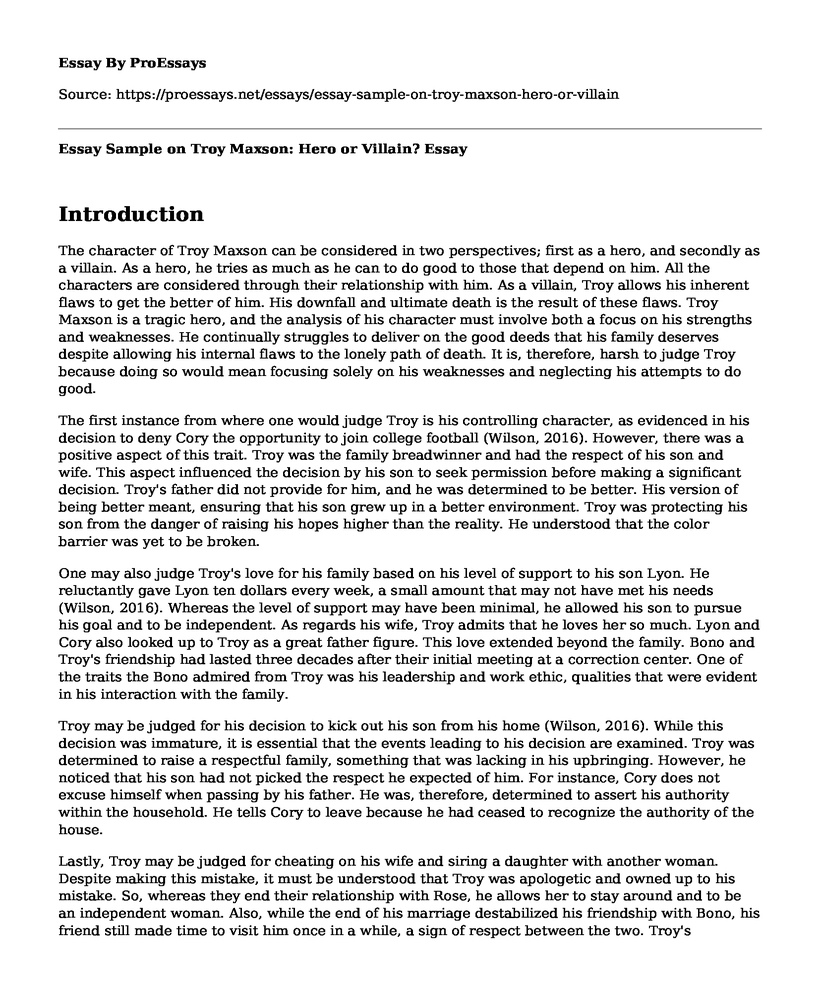Introduction
The character of Troy Maxson can be considered in two perspectives; first as a hero, and secondly as a villain. As a hero, he tries as much as he can to do good to those that depend on him. All the characters are considered through their relationship with him. As a villain, Troy allows his inherent flaws to get the better of him. His downfall and ultimate death is the result of these flaws. Troy Maxson is a tragic hero, and the analysis of his character must involve both a focus on his strengths and weaknesses. He continually struggles to deliver on the good deeds that his family deserves despite allowing his internal flaws to the lonely path of death. It is, therefore, harsh to judge Troy because doing so would mean focusing solely on his weaknesses and neglecting his attempts to do good.
The first instance from where one would judge Troy is his controlling character, as evidenced in his decision to deny Cory the opportunity to join college football (Wilson, 2016). However, there was a positive aspect of this trait. Troy was the family breadwinner and had the respect of his son and wife. This aspect influenced the decision by his son to seek permission before making a significant decision. Troy's father did not provide for him, and he was determined to be better. His version of being better meant, ensuring that his son grew up in a better environment. Troy was protecting his son from the danger of raising his hopes higher than the reality. He understood that the color barrier was yet to be broken.
One may also judge Troy's love for his family based on his level of support to his son Lyon. He reluctantly gave Lyon ten dollars every week, a small amount that may not have met his needs (Wilson, 2016). Whereas the level of support may have been minimal, he allowed his son to pursue his goal and to be independent. As regards his wife, Troy admits that he loves her so much. Lyon and Cory also looked up to Troy as a great father figure. This love extended beyond the family. Bono and Troy's friendship had lasted three decades after their initial meeting at a correction center. One of the traits the Bono admired from Troy was his leadership and work ethic, qualities that were evident in his interaction with the family.
Troy may be judged for his decision to kick out his son from his home (Wilson, 2016). While this decision was immature, it is essential that the events leading to his decision are examined. Troy was determined to raise a respectful family, something that was lacking in his upbringing. However, he noticed that his son had not picked the respect he expected of him. For instance, Cory does not excuse himself when passing by his father. He was, therefore, determined to assert his authority within the household. He tells Cory to leave because he had ceased to recognize the authority of the house.
Lastly, Troy may be judged for cheating on his wife and siring a daughter with another woman. Despite making this mistake, it must be understood that Troy was apologetic and owned up to his mistake. So, whereas they end their relationship with Rose, he allows her to stay around and to be an independent woman. Also, while the end of his marriage destabilized his friendship with Bono, his friend still made time to visit him once in a while, a sign of respect between the two. Troy's repentant side is equally evident in the way he relates to his daughter. He tries as much as he can to portray his good attributes.
It would be unfair to judge Troy considering his struggles to have a human balance between doing good and overcoming his internal flaws. When he succumbs to his heart attack, he is regarded as a hero. His gesture to support Lyon financially each week is laudable, his leadership and brotherliness towards Bono remain firm, and his wisdom in protecting Cory's future is evident. Allowing his flaws to overcome him should not blur the good deeds he extends to his family and friends.
References
Wilson, A. (2016). Fences (Vol. 6). Penguin.
Cite this page
Essay Sample on Troy Maxson: Hero or Villain?. (2023, Jan 09). Retrieved from https://proessays.net/essays/essay-sample-on-troy-maxson-hero-or-villain
If you are the original author of this essay and no longer wish to have it published on the ProEssays website, please click below to request its removal:
- Biography of Laura C Redden Searing. Paper Sample
- Poetry Analysis Essay on The Dance by Carlos Williams
- Book Analysis Essay on "A Raisin in the Sun"
- Compare and Contrast Essay on Poems Half-past Two, Reports and Dear Mr. Lee
- Essay Example on Unlock Literacy Skills With English Literature: A Must for Schools
- Paper Example on Two Literary Luminaries: Michael Ondaatje & Jhumpa Lahiri
- Book Review Sample on The Tale-Tell Heart







